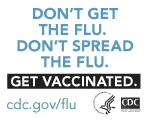CDC Features
Current Features
March is Colorectal Cancer Awareness Month!

Among cancers that affect both men and women, colorectal cancer—cancer of the colon or rectum—is the second leading cause of cancer-related deaths in the United States. Colorectal cancer also is one of the most commonly diagnosed cancers in the United States.
The risk of developing colorectal cancer increases with advancing age. More than 90% of cases occur in people aged 50 or older.
Reducing Your Risk

Colorectal cancer screening saves lives. However, many people who are at risk for colorectal cancer are not being screened according to national guidelines.
It is estimated that as many as 60% of colorectal cancer deaths could be prevented if all men and women aged 50 years or older were screened routinely. Colorectal cancer almost always develops from precancerous polyps (abnormal growths) in the colon or rectum. Screening tests can find precancerous polyps, so that they can be removed before they turn into cancer. Screening tests also can find colorectal cancer early, when treatment works best.
Some studies have shown that increased physical activity and maintaining a healthy weight may decrease the risk for colorectal cancer. Evidence is less clear about other ways to prevent colorectal cancer.
Currently, there is no consensus on the role of diet in preventing colorectal cancer; however, medical experts recommend a diet low in animal fats and high in fruits, vegetables, and whole grain products to reduce the risk of other chronic diseases, such as coronary artery disease and diabetes.
In addition, researchers are examining the role of certain medications and supplements, including aspirin, calcium, vitamin D, and selenium, in preventing colorectal cancer. While these supplements may reduce the risk of colorectal cancer, the most effective way to reduce your risk is by having regular colorectal cancer screening tests beginning at age 50.
When Should You Begin to Get Screened?
You should begin screening for colorectal cancer soon after turning 50, then continue getting screened at regular intervals. However, you may need to be tested earlier or more often than other people if:
• You or a close relative have had colorectal polyps or colorectal cancer; or
• You have inflammatory bowel disease.
What Are the Screening Tests for Colorectal Cancer?

Several tests are available to screen for colorectal cancer. Some are used alone; others are used in combination with each other. Talk with your doctor about which test or tests are best for you.
• Colonoscopy (every 10 years)
• Fecal Occult Blood Test (FOBT) (every year)
• Flexible Sigmoidoscopy (every 5 years)
• Double-Contrast Barium Enema (every 5 years)
Other tests are currently being evaluated and may be recommended for use in colorectal cancer screening in the future, including CT colonography (also known as “virtual colonoscopy”) and stool DNA testing.
For More Information
- Colorectal (Colon) Cancer
- Frequently Asked Questions
- Questions to Ask Your Doctor
- Screen for Life Basic Facts on Screening (
 2 pages, 314KB) (fact sheet)
2 pages, 314KB) (fact sheet) - Información básica sobre los exámenes de detección (
 2 pages, 300KB) (Spanish fact sheet)
2 pages, 300KB) (Spanish fact sheet) - Colorectal Cancer Screening Saves Lives (
 2 pages, 407KB) (brochure)
2 pages, 407KB) (brochure) - Rompamos el silencio (
 2 pages, 159KB) (Spanish brochure)
2 pages, 159KB) (Spanish brochure) - Regular Screening Prevents Colorectal Cancer (
 4 minutes 27 seconds)
4 minutes 27 seconds) - Send a Screening Health-e-Card
Page last updated: March 3, 2008
Content source: Division of Cancer Prevention and Control
Content owner: National Center for Health Marketing
URL for this page: www.cdc.gov/Features/ColorectalAwareness



